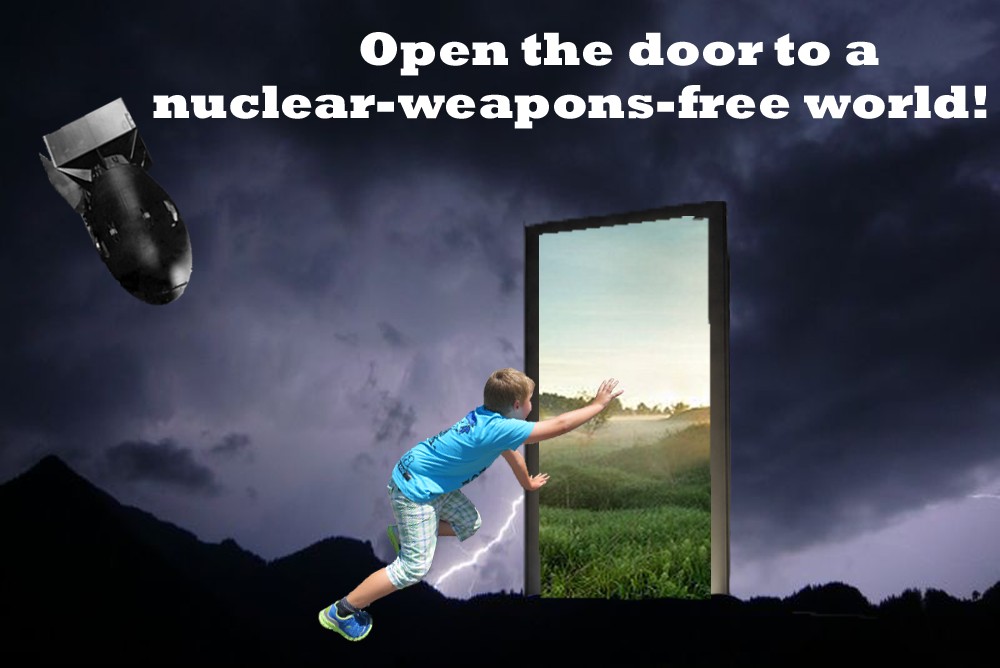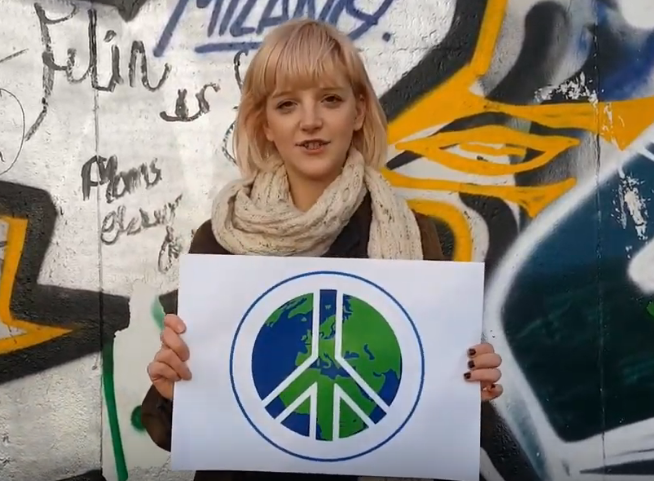
Treaty to Prohibit Nuclear Weapons Close to Becoming World Law
Since June, Botswana, Fiji, Ireland, Malaysia, Malta, Nigeria, Niue, Saint Kitts and Nevis, and Tuvalu ratified the Treaty on the Prohibition of Nuclear Weapons (TPNW) and Malta, Mozambique, and Sudan signed it.
Former NATO Leaders Endorse the Treaty on the Prohibition of Nuclear Weapons

International Campaign for the Abolition of Nuclear Weapons (ICAN)
(October 21, 2020) — A letter from 56 former prime ministers, presidents and defence ministers from NATO states published in late September calls on current leaders to join the TPNW. The former UN secretary-general Ban Ki-moon and two former NATO secretaries-general, Javier Solana and Willy Claes, are among the co-signers. This represents the most significant show of high-level support for the treaty in these countries.
In the letter, the former leaders and ministers declare that “nuclear weapons serve no legitimate military or strategic purpose in light of the catastrophic human and environmental consequences of their use” and urge the current leaders to “show courage and boldness — and join the treaty”. They warn that the risk of nuclear weapons being used today, “whether by accident, miscalculation or design”, appears to be increasing, and state: “We must not sleepwalk into a crisis of even greater proportions than the one we have experienced this year.”
The co-signers are from Albania, Belgium, Canada, Croatia, the Czech Republic, Denmark, Germany, Greece, Hungary, Iceland, Italy, Japan, Latvia, the Netherlands, Norway, Poland, Portugal, Slovakia, Slovenia, South Korea, Spain, and Turkey.
And in Belgium, a government declaration adopted in early October states that “Belgium will play a proactive role in the 2021 NPT Review Conference and, together with European NATO allies, will explore how to strengthen the multilateral non-proliferation framework and how the UN Treaty on the Prohibition of Nuclear Weapons can give new impetus to multilateral nuclear disarmament.” This represents a significant policy shift in a country which, despite public support, has officially opposed the treaty.

Understanding Entry into Force
The Treaty on the Prohibition of Nuclear Weapons, with 47 states parties, is only three ratifications or accessions away from reaching the threshold for it to enter into force. The TPNW will enter into force 90 days after the 50th ratification.
What does that mean? Once the treaty enters into force, all of its prohibitions and positive obligations will take full effect for states parties. Based on the historical precedent of past weapons prohibitions, we can also expect that the treaty’s entry into force can influence the behaviour of states not party. Learn more in our recent briefing paper.
Recent webinars explore implementing the treaty’s positive obligations, including this webinarshowcasing victim’s experiences and government perspectives, a webinar about the role of the European Union to help with victim assistance under the treaty and this webinar on establishing a framework and principles for victim assistance for toxic remnants of war, based on past legal precedent and experience.

North Korea’s ballistic missile, North Korea Victory Day 2013 (Wikimedia CCBY2.0: Photo: Stefan Krasowski)
Warheads and COVID on the Rise
As coronavirus cases around the world rise, nuclear-armed states’ investment in their doomsday weapons continues unabated. In a 10 October military parade, North Korea unveiled new long-range missiles to deliver nuclear weapons. One of these missiles is one of the largest intercontinental ballistic missiles in the world; another can launch nuclear weapons from submarines. North Korea, with the smallest nuclear arsenal in the world, possessing 30-40 nuclear warheads out of the global 13,400 total, demonstrates that any number of nuclear weapons is too many.
China too continues to expand its nuclear arsenal. An annual U.S. Department of Defense report projected that China will have a stockpile of less than 500 nuclear warheads in the next decade. It currently has 320 warheads. China also continues to increase its number of nuclear-capable missiles, according to the report, and is increasing the number of warheads it can fit on some of its missiles, like the DF-5A intercontinental ballistic missile.
The last verifiable bilateral limit on the two largest nuclear arsenals will expire in just over three months, in February 2021, unless Russia and the United States agree to extend the New Strategic Arms Reduction Treaty (New START). Russia and the United States may agree to freeze their nuclear warheads for one year and to extend New START for one year, but negotiations are still ongoing.
The two countries with the largest nuclear arsenals, which in 2019 collectively spent an estimated $44 billion on nuclear weapons, are also two countries hard hit by the pandemic. Their people need health care, not a new arms race. While extending the cap on nuclear warheads is a start, steeper cuts and complete verified elimination under the TPNW are necessary next steps.
Nuclear-armed states and their allies are preparing to use their weapons of mass destruction. NATO’s annual nuclear exercise “Steadfast Noon,” hosted by the Netherlands, took place in October, where Belgian, Dutch and Italian fighter aircraft practiced launching nuclear weapons. The U.S. nuclear command and control exercise “Global Thunder” started on 19 October and includes personnel from Australia and the United Kingdom.

International Support for the TPNW Stays Strong
Linnet Ng’ayu of the African Council of Religious Leaders delivers a statement to the 2020 First Committee on behalf of ICAN.
Although the circumstances of the annual multilateral meetings on nuclear weapons are unusual this autumn, the overwhelming recognition of the unacceptable risk that nuclear weapons pose to humanity and the important contribution of the TPNW remains constant.
At the 2020 General Conference of the International Atomic Energy Agency (IAEA) in late September, several states, including Ireland and Costa Rica, welcomed the adoption of the TPNW, noting that it strengthens the safeguards regime envisioned under Article III of the Nuclear Non-Proliferation Treaty. Austria also announced its offer to host the first TPNW meeting of states parties in Vienna.
The first meeting of states parties will take place within one year of the TPNW’s entry into force. France delivered a statement on behalf of China, France, Russia, the United Kingdom, and the United States, claiming that the IAEA was not an appropriate forum to discuss the TPNW.
At the International Day for the Total Elimination of Nuclear Weapons on 26 September, dozens of states and regional groups highlighted the importance of the TPNW and its complementarity with international law, urged other states to join and announced that they are currently in the process of ratifying the treaty. Read a full report of the day here.
The UN General Assembly First Committee, which began on 5 October, has already featured overwhelming support of the TPNW. Over a dozen states have announced that they are in the process of ratifying the treaty. Brazil called the TPNW “an evolutionary leap for the disarmament and non-proliferation regime.”
There was very little opposition to the treaty. Russia raised its objections to the TPNW in an informal discussion on 13 October. The First Committee is scheduled to conclude on 5 November. Watch the session live here, or follow Reaching Critical Will for updates.

New Resources
Jean Marie Collin and Patrice Bouveret, Radioactivity Under the Sand: The Waste from French Nuclear Tests in Algeria, Heinrich Böll Foundation, July 2020.
Confronting Conflict Pollution: Principles for Assisting Toxic Remnants of War, Harvard Law School International Human Rights Clinic Conflict and Environment Observatory, September 2020.
Fatima Alkali, “A world free from nuclear weapons: a call to action from Nigeria,” International Committee of the Red Cross, 1 October 2020.
Posted in accordance with Title 17, Section 107, US Code, for noncommercial, educational purposes.

Nuke-Free Europe Action Meeting: October 31; Time: 13 CET
International Peace Bureau
To register for the Zoom Meeting contact: arielled@ipb.org
further information: http://www.ipb.org/events/international-action-meeting-for-a-nuclear-free-europe-2/
Introduction
Tensions around nuclear weapons are growing on the European continent, between Russia and the US and their allies, and the main nuclear bilateral disarmament agreements have been destroyed. Nevertheless, the Treaty the Prohibition of Nuclear Weapons will soon enter into force and it clearly prohibits any nation from allowing any stationing, installation or deployment of any nuclear weapons or other nuclear devices in its territory or at any place under its jurisdiction or control.
Despite this international prohibition, the determination of the US government to “modernize” the nuclear weapons hosted in the 5 states (Italy, Germany, The Netherlands, Belgium and Turkey) is unaffected, and is planned to begin next year. The new bombs (B61-12) will start to be produced next year.
With a guided tail kit that increases their targeting accuracy and efficiency, they can cover all bomb missions (tactical as well as strategic). On top of this « efficiency » to kill and destroy, the cost of the weapons and the aircraft carrier is huge in terms of money, resources, and environmental degradation, at a time where resources and cooperation are urgently needed for healthcare and environmental preservation.
In the five hosting states, the protests are building up and there is a will to coordinate actions and expand them beyond each country.
This Online Conference is dedicated to:
– Informing and debating about the global situation and in each hosting state
– Exploring possible joint actions against the “modernization” of the nuclear arsenals
Program
1:00-1:10 Opening Presentation of the NUCLEAR WEAPON FREE EUROPE NETWORK — Reiner Braun, IPB
1:00-1:15: What is the impact of the TPNW on hosting states? ICAN representative
1:15-1:20: Overview and proposals: Ludo de Brabander, VREDE
Updates from national networks against nuclear weapons in hosting states:
1:20-1:30: Situation in Italy
1:30-1:40: Situation in the Netherlands
1:40-1:50: Situation in Germany
1:50-2:00: Situation in Belgium
2:00-2:10: Summary of possible common actions
2:10-3:50: Discussion- Q&A
3:50-4:00: Conclusion Information list of the network No to War – No to NATO
www.no-to-nato.org, info@no-to-nato.net
Webinar: July 16th, 2020: Nuclear weapons in the NATO Strategy
https://www.no-to-nato.org/2020/07/2020-07-16-zoom-webinar9am-edt-2pm-bst-3pm-cest-10pm-jstnuclear-weapons-in-the-nato-strategy/
Zoom Meeting and Live stream on Facebook.
registration on info@no-to-nato.org
Follow us also on
www.facebook.com/NotoWAR.NotoNATO
twitter.com/no_to_nato